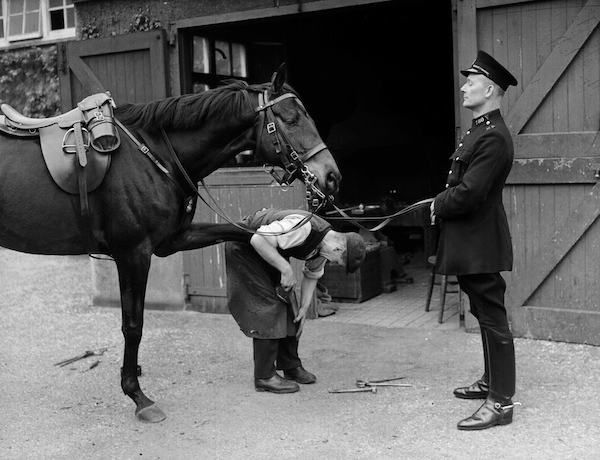‘(1) A person is guilty of an offence if he:
(a) uses threatening, abusive or insulting words or behaviour, or disorderly behaviour, or
(b) displays any writing, sign or other visible representation which is threatening, abusive or insulting.’
—Section 5, Public Order Act 1986
Do you ever growl at dogs? It’s something I’ve been known to do while out and about. I like dogs in general, but some breeds are given to facial expressions which annoy me. Labradors, for example, always seem to me complacent and self-righteous, especially the yellow ones. I sometimes growl at them in order to disturb their evident self-satisfaction, or yap quietly to see how they react. Alsatians, too, always seem a bit too bloody sure of themselves for my liking. And I can never look at a Weimaraner without getting the impression that it despises me for some reason; there is something about those milky eyes which betokens contempt. So they sometimes get a growl if I see one in the street.
I also tend to bark back if a dog barks at me, especially if it is on a chain and cannot get at me. I like the fury in their eyes, the apoplexy, the sense of outrage. Incidentally, I have an Italian friend who is able to freeze dogs in a crouching position while they are going about their toilet. He goes up to them as they begin their noisome business and fixes them in the eye and then clenches his hands together tightly. For some reason this makes the dog unyieldingly rigid and they can’t move until he’s clapped his hands. I don’t do this — I think it is going too far. And I do the growling/barking thing only very occasionally, too; it is not an obsession or anything. And I hadn’t known it was illegal.
It is illegal, though — under Section 5 of the 1986 Public Order Act. It amounts to ‘insulting’ behaviour. A northern gentleman, Mr Kyle Little, saw some Labradors in the street and quite rightly, in my opinion, growled at them very briefly and very quietly. He also went ‘woof’, slightly more loudly. He was arrested by the police, held in a cell for five hours, charged and convicted. Later he had his conviction quashed — the entire business cost the taxpayer eight thousand quid. The dog owner hadn’t wished for Kyle Little to be prosecuted, or indeed even imagined that such a thing could happen. But this is the trouble with the word ‘insulting’, as used in a court of law: it can mean absolutely anything. Desmond Morris once posited that almost anything can be interpreted as an insult — depending upon the disposition of the person or creature who is perceived to be the victim. It has no objective status.
There’s a campaign at the moment to get the word ‘insulting’ removed from the 1986 Act — a campaign which I have now got myself involved in. It would be nice to affix one’s name to a cause on the strength of pure, shining principle — but I suppose I should admit that in this case there’s a certain self-interest and self-preservation at work. I suspect I contravene Section 5 of the Public Order Act on a daily, if not hourly, basis. My wife claims that she is sometimes woken by me contravening it in my sleep.
The remarkable thing, though, is that I can find nobody who wishes — in public at least — for the word not to be removed from the act. The alliance in favour of reform must be unique in its breadth, unique in the number of individuals and organisations who usually loathe one another, banded together to get the wording changed and protect a little bit of freedom of speech, the freedom to insult someone. The National Secular Society and the British Humanists wish for reform with every bit as much fervour as does the Christian Legal Centre. The Evangelical Alliance, if you read their submission to the government on this matter, would also be disinclined, I think, to allow Section 5 in its current format to stay in one of its guesthouses overnight. On which subject, the gay campaigner Peter Tatchell wants reform, as does the leader of Ukip, Nigel Farage. There are Greens and Monday-Clubbish Tories and metro-liberal Liberals and Blairite Labour MPs, all wishing for this word to be struck from the statute book so that we might insult one another with impunity. Even the British Naturists have demanded reform. I have no idea why they have got themselves mixed up in this, but welcome on board and keep your penises well away from me, please.
The act under its present wording has been used in a number of fantastically ludicrous cases. There is even an argument to be made in favour of keeping the words just as they are in order to give us all a good laugh at some fatuous prosecution. It is used, basically, for two reasons: first, to criminalise people who express inconvenient political views. Christians have been arrested merely for reading extracts from the bible, for example. Gays have been arrested for suggesting that Islam is a bit silly on the subject of homosexuality. One old bloke was warned he would be prosecuted because he put a sign up in his window stating that religion was ‘fairy tales for grown-ups’. If it is even remotely possible that someone might be offended, the Old Bill step in. Which is the other area in which it is used: against someone who has been a bit arsey to the fuzz and they can’t get him on any other charge. The most famous of those cases came with the student who called a police horse ‘gay’.
Despite almost universal backing for reform, the law is still there, as it has been for 26 years. Let’s get rid of it.







Comments